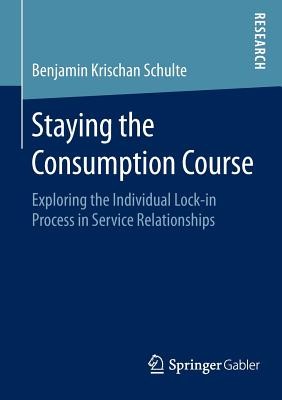
- We will send in 10–14 business days.
- Author: Benjamin Krischan Schulte
- Publisher: Springer Gabler
- Year: 2015
- Pages: 228
- ISBN-10: 3658087870
- ISBN-13: 9783658087876
- Format: 14.8 x 21 x 1.4 cm, minkšti viršeliai
- Language: English
- SAVE -10% with code: EXTRA
Reviews
Description
Benjamin Krischan Schulte develops a process-model of consumer lock-in in service relationships by connecting three areas of research: path dependence, consumer behavior and service relationship marketing. He defines consumer lock-in as a situation of a potentially unaware inability to switch from or exit a consumption process due to entrenchment with increasing barriers on the individual and/or social level. Switching barriers are elaborated as consumer lock-in mechanisms. The resulting process model is outlined and empirically examined in an explorative panel study of a service relationship process in higher education. The author´s findings support the presence of consumer lock-in in services as an idiosyncratic process of gradual entrapment. The phenomenon has relevance for researchers and practitioners in complex service relationships, where lock-in was found to be a likely occurrence but difficult to grasp.
EXTRA 10 % discount with code: EXTRA
The promotion ends in 21d.01:57:16
The discount code is valid when purchasing from 10 €. Discounts do not stack.
- Author: Benjamin Krischan Schulte
- Publisher: Springer Gabler
- Year: 2015
- Pages: 228
- ISBN-10: 3658087870
- ISBN-13: 9783658087876
- Format: 14.8 x 21 x 1.4 cm, minkšti viršeliai
- Language: English English
Benjamin Krischan Schulte develops a process-model of consumer lock-in in service relationships by connecting three areas of research: path dependence, consumer behavior and service relationship marketing. He defines consumer lock-in as a situation of a potentially unaware inability to switch from or exit a consumption process due to entrenchment with increasing barriers on the individual and/or social level. Switching barriers are elaborated as consumer lock-in mechanisms. The resulting process model is outlined and empirically examined in an explorative panel study of a service relationship process in higher education. The author´s findings support the presence of consumer lock-in in services as an idiosyncratic process of gradual entrapment. The phenomenon has relevance for researchers and practitioners in complex service relationships, where lock-in was found to be a likely occurrence but difficult to grasp.


Reviews